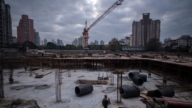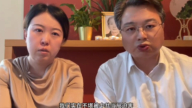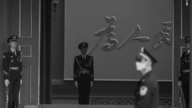【新唐人2013年11月12日訊】11月9號,中共三中全會開幕。在此之前的一天,中共黨報《人民日報》再次拋出有關「兩個三十年互不否定」的說法。大陸學者指出,中共前領導人鄧小平的改革開放政策,事實上就是「對毛澤東的大躍進和文革的否定」,但是中共為了維護自己的統治合法性而掩耳盜鈴。而《人民日報》的說法,預示著三中全會不會帶來根本的變化。
《人民日報》這篇文章是基於中共總書記習近平一月份的講話。1月5號習近平在高層會議上宣稱:「不能用改革開放後的歷史時期否定改革開放前的歷史時期,也不能用改革開放前的歷史時期否定改革開放後的歷史時期。」。
北京外國語大學新聞學副教授喬木對《新唐人》表示,中共執政的前後三十年肯定是互相否定的。在此之前中共也對「文革」進行了徹底否定。
喬木:「前30年肯定是否定後30年的,前30年所謂的人民公社、大躍進、文革這一套,肯定是否定後30年的改革開放市場經濟這一套的。回到後30年來說,對前30年也是一個否定。最起碼從中共有一個十三屆六中全會,已經對文革是徹底否定了的。即使是對毛,事實上也是否定的。」
喬木分析,習近平這麼講,有他的政治上的考慮。他是為了強調共產黨的領導權威,強調意識形態,強調社會主義制度。
喬木:「隨著市場經濟國際化的發展,對這種正統的意識形態實際都是否定的,或者至少沒有多大吸引力,從他來說,不否定前30年,其實就是想重新找回所謂的制度或理論自信,也就是維護黨的領導的一致性,習近平講話也提到過,確保紅色江山不變色。」
大陸自由派媒體《炎黃春秋》雜誌副社長楊繼繩表示,所謂「不能相互否定」就是不能否定共產黨的領導。
大陸《炎黃春秋》雜誌副社長楊繼繩:「否定後30年就是否定改革開放,否定前30年就是否定共產黨的一貫領導,否定毛澤東,毛澤東跟共產黨是不可分的,所以為了維護共產黨的領導,當然不能否定它。」
曾任雅虎中國總經理的謝文分析,習近平發表這番言論的另外一個原因是,高層派系鬥爭激烈,習近平試圖彌合裂痕。
謝文:「在現在左右尖銳對立,大家看法不一,矛盾重重,而國內又面臨下一步要改革的呼聲很高的情況下,他只好相對來說站在一個中立的立場上,因為現在社會上一部份人否定前30年,一部份人否定後30年。那麼他乾脆說,哇,這兩個其實是有一致的地方,你們既不要否定前30年,也不要否定後30年。」
喬木指出,事關一個國家和十三億人大政方針的會議,中共卻採取完全封閉的秘密形式,令人詫異,也顯示出中共不會有根本性的變化。
喬木:「一般認為還是換湯不換藥。天不變,道亦不變。穿舊鞋走老路。知識份子肯定是不太滿意。他們希望能在言論自由、司法獨立、學術自由各方面有更大的空間。可是從整個半年以來對網絡整肅、言論打壓來說,目前看不到這個跡象。」
喬木表示,從民眾來說,他們更關注民生,希望民生福利諸如養老、醫療、住房等方面有改善,但是現在沒有看到有多少變化。至於商人,一直在選擇用腳投票。從香港商人李嘉誠撤資,到中國大量移民潮,顯示他們在規避風險,對未來發展不信任,不看好。
上世紀80年代,曾擔任中共中央政治體制改革研討小組研究人員的吳偉,對美國《紐約時報》表示,中共一方面舉起左派的旗幟,一方面說必須有改革。他們沒有顯示任何解決政治問題的願望。但是如果他們不在政治層面解決問題,大多數這些經濟改革措施在完成之前,將土崩瓦解。
採訪編輯/秦雪 後製/李勇
Communist Regime Dares Not Disprove Mao Zedong
Prior to November 9, the opening day of the Third Plenary,
the Chinese Communist Party (CCP) controlled newspaper,
People’s Daily, published an article on ‘no denying the first
30 years of history (before reform) with second 30 years
of history (after reform), and vice versa.’
A Chinese scholar analyses how former leader
Deng Xiaoping’s reform and opening policy has in fact
disproved Mao Zedong’s political movements,
the Great Leap Forward and the Cultural Revolution.
In order to maintain its ruling legitimacy, the CCP
has been entirely deceiving.
The People’s Daily article is just another sign
of the fact that the Third Plenum won’t bring change.
The People’s Daily article was based on the CCP General
Secretary Xi Jinping’s January speech.
On January 5, Xi Jinping talked at a high-level meeting
about ‘not disproving the history prior to the reform
and opening with history after the reform and opening,’
and vice versa.
Beijing Foreign Studies University associated professor
at the School of English and International Studies,
Qiao Moo, told the NTD TV that during the 60 years
of ruling, the CCP has in fact negated one another.
The CCP has also completely disproved
the Cultural Revolution.
Qiao Moo, Associate professor of Beijing Foreign Studies
University: “The first 30 years would definitely
have negated the second 30 years.
In those 30 years, the so-called people’s communes,
the Great Leap Forward, the Cultural Revolution,
would definitely have negated the reform and
opening up of the market economy.
The second 30 years also definitely disproved
the first 30 years.
During the 6th Plenary of the 13th CPC Central Committee,
the Cultural Revolution was already disproved.
Even Mao was disproved."
Qiao Moo analyses a political agenda in Xi Jinping’s talk.
He wanted to stress the authority of the CCP,
the ideology, and the socialist system.
Qiao Moo: “Internationalization of the market economy
in fact denies or pays no attention to the ideology.
To him, not to deny the first 30 years is to restore the system
or regain the belief so that the leadership
of the CCP can be maintained.
Xi Jinping has previously mentioned the importance
of the country staying ‘red.'"
The Chinese liberalism magazine, Yanhuang Chunqiu,
deputy director Yang Jisheng explains that the so-called
‘no negating each other’ means no denying
the CCP leadership.
Yang Jisheng, deputy director of Yanhuang Chunqiu:
“Negating the second 30 years is to negate the reform
and opening up, and negating the first 30 years is to negate
the leadership of the CCP and Mao Zedong.
Mao and the CCP are inseparable.
They have to maintain the CCP leadership.
They can not deny either one."
Former Yahoo China general manager Xie Wen analyses
Xi Jinping’s talk as trying to bridge the rift
in the political infightings.
Xie Wen, former general manager of Yahoo China: “Facing
the conflict between the rightist and the leftist and the strong
demand of reform, he put himself in a neutral position.
Some people oppose the first 30 years,
while others deny the second 30 years of the CCP ruling.
He therefore came up with a neutral idea
of not denying either one."
Qiao Moo expresses his disbelief in the CCP’s closed door
policy during meetings.
He thinks it is significant as that it matters
to a country with a population of 1.3 billion people.
It suggests there won’t be any fundamental change
in the CCP.
Qiao Moo: “It is just old wine in a new bottle.
Nothing will change.
It is like wearing the same shoes and taking the same road.
The intellectuals are generally unhappy about it.
They want freedom of speech, an independent judiciary,
and more academic freedom.
According to the suppression of the Internet and the media
this year, there is no sign of change."
Qiao Moo believes that people care more about the livelihood
and welfares, such as pension, health care, and housing,
but nothing has happened yet.
As for the businessmen, they vote with their feet.
For example, Hong Kong businessman Li Ka-shing
cut his ownership stake in China, and
the massive emigration from China has shown people’s
concern and distrust of the risk and future in China.
Wu Wei, a former aide to central party leaders who were
involved in planning China’s market overhauls in the 1980s
told the New York Times, “In one hand, they’re holding up
the leftist banner.
On the other hand, they say there must be reform,”
Mr. Wu said.
“They don’t show any desire to take on political issues,
but if you don’t take on issues at the political level, most
of these economic reform measures will fall apart before
they’re completed,” reported the New York Times.
Interview Edit / Qin Xue Post-produciton /































